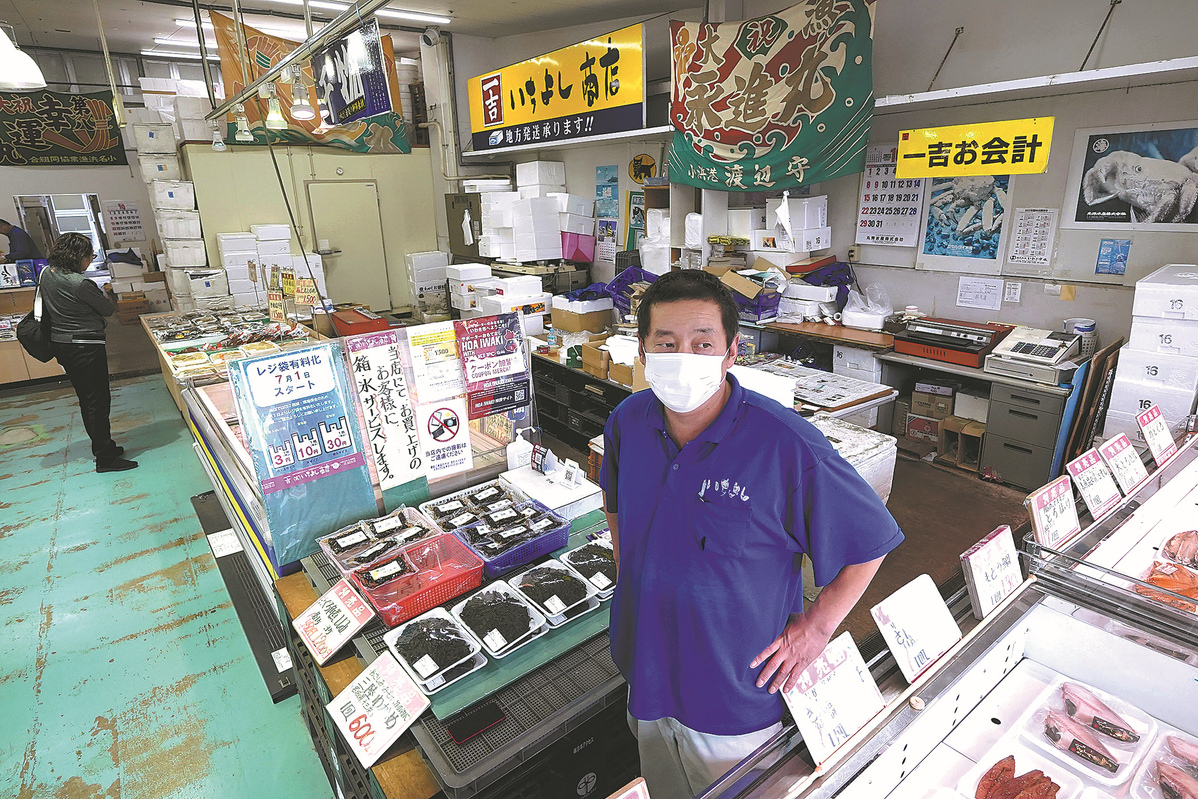 A fish store manager stands at a seafood market in Iwaki, Fukushima Prefecture, on Oct 19. Fukushima's local catch today is still about one-fifth of its pre-disaster levels because of a decline in the fishing population and smaller catch sizes. EUGENE HOSHIKO/AP
A fish store manager stands at a seafood market in Iwaki, Fukushima Prefecture, on Oct 19. Fukushima's local catch today is still about one-fifth of its pre-disaster levels because of a decline in the fishing population and smaller catch sizes. EUGENE HOSHIKO/AP
When I interviewed Japanese citizens at rallies protesting against the release of nuclear-contaminated water from the Fukushima Daiichi Nuclear Power Plant into the sea, I asked them a question: Considering that there is no sign of a halt to the ocean discharge, why do you still participate in such protests?
"To be honest, I don't see any possibility of a halt to the dumping of the radioactive water," said Toshihiko Sasaki, 71, a citizens' group member who lives in Chiba Prefecture. "The power of citizens is weak, but we won't give up."
Noriko Mukasa, a 72-year-old resident of Chiba, said: "We're all saying, 'Stop it, stop it', but I think that the voices of those who are saying 'stop' need to get louder. We can't just stay silent."
Chiyo Oda, an activist in Iwaki, Fukushima Prefecture, is one of the plaintiffs suing the Japanese government and Tokyo Electric Power Company, the operator of the crippled Fukushima plant, in an attempt to stop the ocean discharge. She is co-director of KOREUMI, also known as the Citizens' Conference to Condemn Further Pollution of the Ocean.
KOREUMI was formed primarily by Fukushima residents who have experienced the disaster following the nuclear accident at the Fukushima plant in March 2011, along with people across Japan who share the concerns, in the hope of preventing the spread of radiation that was released during the accident.
"What we can do, first and foremost, is to raise our voices to protect a peaceful everyday life," Oda said. "I believe it involves sharing that sentiment with people both domestically and internationally, demonstrating our opposition to the ocean discharge."
Members of the organization come from various backgrounds and lifestyles, each contributing with what they can.
"Casually discussing this issue with ordinary citizens living in the affected areas of Fukushima is in line with the purpose of KOREUMI," she said.
Societal change
"It is essential to share the issue through casual conversations with neighbors and people you meet in town, expressing concerns about the potential flow of radiation into the sea for the sake of children and grandchildren, and the desire to eat delicious fish with peace of mind. I believe that societal change can occur through such interactions."
Many Japanese citizens expressed understanding toward people from other countries who oppose Tokyo dumping nuclear-contaminated water into the sea.
"I don't want to eat contaminated fish or vegetables … I think Japanese and Chinese people share the same concern about not wanting to consume contaminated food," said Yuya Kamoshita, a former resident of Iwaki and one of the plaintiffs suing the Japanese government and TEPCO.
He said TEPCO should immediately stop discharging the nuclear-contaminated water into the sea.
Nahoko Hishiyama, secretary-general of a grassroots group opposed to a proposal by the late former Japanese prime minister Shinzo Abe to revise Japan's constitution, said, "The ocean discharge has caused trouble for countries around the world, and I feel very sorry about this."





